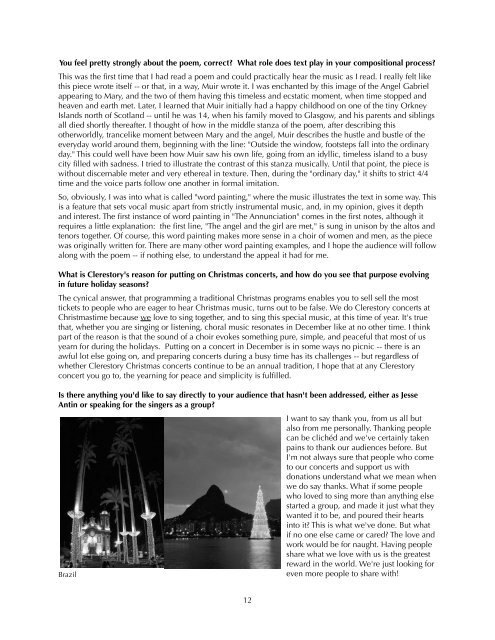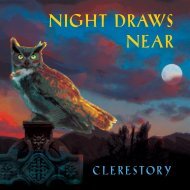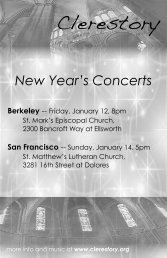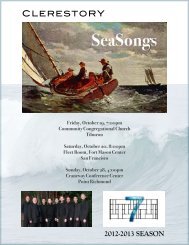Festive Christmas songs and familiar carols from Spain ... - Clerestory
Festive Christmas songs and familiar carols from Spain ... - Clerestory
Festive Christmas songs and familiar carols from Spain ... - Clerestory
You also want an ePaper? Increase the reach of your titles
YUMPU automatically turns print PDFs into web optimized ePapers that Google loves.
You feel pretty strongly about the poem, correct? What role does text play in your compositional process?<br />
This was the first time that I had read a poem <strong>and</strong> could practically hear the music as I read. I really felt like<br />
this piece wrote itself -- or that, in a way, Muir wrote it. I was enchanted by this image of the Angel Gabriel<br />
appearing to Mary, <strong>and</strong> the two of them having this timeless <strong>and</strong> ecstatic moment, when time stopped <strong>and</strong><br />
heaven <strong>and</strong> earth met. Later, I learned that Muir initially had a happy childhood on one of the tiny Orkney<br />
Isl<strong>and</strong>s north of Scotl<strong>and</strong> -- until he was 14, when his family moved to Glasgow, <strong>and</strong> his parents <strong>and</strong> siblings<br />
all died shortly thereafter. I thought of how in the middle stanza of the poem, after describing this<br />
otherworldly, trancelike moment between Mary <strong>and</strong> the angel, Muir describes the hustle <strong>and</strong> bustle of the<br />
everyday world around them, beginning with the line: "Outside the window, footsteps fall into the ordinary<br />
day." This could well have been how Muir saw his own life, going <strong>from</strong> an idyllic, timeless isl<strong>and</strong> to a busy<br />
city filled with sadness. I tried to illustrate the contrast of this stanza musically. Until that point, the piece is<br />
without discernable meter <strong>and</strong> very ethereal in texture. Then, during the "ordinary day," it shifts to strict 4/4<br />
time <strong>and</strong> the voice parts follow one another in formal imitation.<br />
So, obviously, I was into what is called "word painting," where the music illustrates the text in some way. This<br />
is a feature that sets vocal music apart <strong>from</strong> strictly instrumental music, <strong>and</strong>, in my opinion, gives it depth<br />
<strong>and</strong> interest. The first instance of word painting in "The Annunciation" comes in the first notes, although it<br />
requires a little explanation: the first line, "The angel <strong>and</strong> the girl are met," is sung in unison by the altos <strong>and</strong><br />
tenors together. Of course, this word painting makes more sense in a choir of women <strong>and</strong> men, as the piece<br />
was originally written for. There are many other word painting examples, <strong>and</strong> I hope the audience will follow<br />
along with the poem -- if nothing else, to underst<strong>and</strong> the appeal it had for me.<br />
What is <strong>Clerestory</strong>'s reason for putting on <strong>Christmas</strong> concerts, <strong>and</strong> how do you see that purpose evolving<br />
in future holiday seasons?<br />
The cynical answer, that programming a traditional <strong>Christmas</strong> programs enables you to sell sell the most<br />
tickets to people who are eager to hear <strong>Christmas</strong> music, turns out to be false. We do <strong>Clerestory</strong> concerts at<br />
<strong>Christmas</strong>time because we love to sing together, <strong>and</strong> to sing this special music, at this time of year. It's true<br />
that, whether you are singing or listening, choral music resonates in December like at no other time. I think<br />
part of the reason is that the sound of a choir evokes something pure, simple, <strong>and</strong> peaceful that most of us<br />
yearn for during the holidays. Putting on a concert in December is in some ways no picnic -- there is an<br />
awful lot else going on, <strong>and</strong> preparing concerts during a busy time has its challenges -- but regardless of<br />
whether <strong>Clerestory</strong> <strong>Christmas</strong> concerts continue to be an annual tradition, I hope that at any <strong>Clerestory</strong><br />
concert you go to, the yearning for peace <strong>and</strong> simplicity is fulfilled.<br />
Is there anything you'd like to say directly to your audience that hasn't been addressed, either as Jesse<br />
Antin or speaking for the singers as a group?<br />
Brazil<br />
12<br />
I want to say thank you, <strong>from</strong> us all but<br />
also <strong>from</strong> me personally. Thanking people<br />
can be clichéd <strong>and</strong> we've certainly taken<br />
pains to thank our audiences before. But<br />
I'm not always sure that people who come<br />
to our concerts <strong>and</strong> support us with<br />
donations underst<strong>and</strong> what we mean when<br />
we do say thanks. What if some people<br />
who loved to sing more than anything else<br />
started a group, <strong>and</strong> made it just what they<br />
wanted it to be, <strong>and</strong> poured their hearts<br />
into it? This is what we've done. But what<br />
if no one else came or cared? The love <strong>and</strong><br />
work would be for naught. Having people<br />
share what we love with us is the greatest<br />
reward in the world. We're just looking for<br />
even more people to share with!






